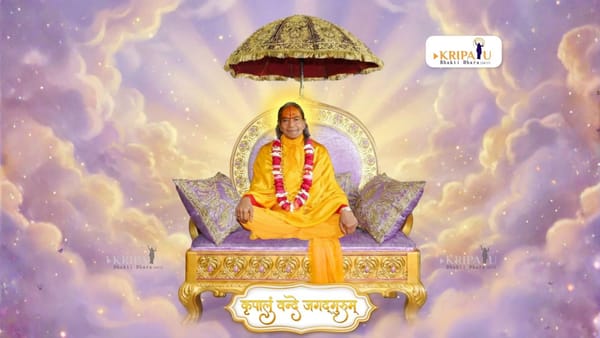Spiritualism or Materialism? – Finding Harmony

In our exploration of Maya's role and its influence on the spiritual path, we've often encountered the dilemma of balancing spiritual pursuits with material needs. Many seekers tend to overlook their material requirements, fearing they may fall into the trap of materialism, hindering their spiritual progress. Jagadguru Shri Kripalu Ji Maharaj elucidated this conundrum beautifully through a story of Gautama Buddha, offering a valuable lesson on this Buddha Jayanti.
Once, Gautama Buddha embarked on a prolonged meditation, abstaining from food and water. As his fast continued, weakening him, he heard village women singing a simple yet profound song about tuning a musical instrument, Tanpura, that said, leaving its strings too loose or stretching too tight doesn’t produce the required sound. The lyrics struck a chord with Buddha, conveying the importance of moderation in one's actions for optimal results.
Similarly, Lord Krishna in the Bhagavad Gita emphasizes moderation, advising against both excessive indulgence and extreme austerity (Gita 6.16 & 6.17). Just as in physical science, where the body requires essential elements in the right proportions and timing, so too does the spiritual aspirant need a balanced approach to life.
The soul's allegiance lies with God, while the body dwells in the material world. Both are integral, and there's no inherent conflict between them. Neglecting the body's needs impedes spiritual progress, leading to distraction and discomfort. Maintaining bodily health enables a focused mind, facilitating deeper spiritual practice.
The Brahma Sutra affirms that even after God-realisation, bodily functions persist. Sanyasis may renounce worldly possessions, yet they still must attend to their physical well-being. This world serves the body's needs but doesn't provide lasting happiness. Proper utilization of worldly resources sustains health and aids spiritual practice.
In essence, there's harmony between spiritualism and materialism, with both playing essential roles. Recognizing and fulfilling the body's needs without excess or deprivation fosters spiritual growth. As the world celebrates Buddha Jayanti, let's heed the wisdom of Gautama Buddha and strive for balance on our spiritual journey.





